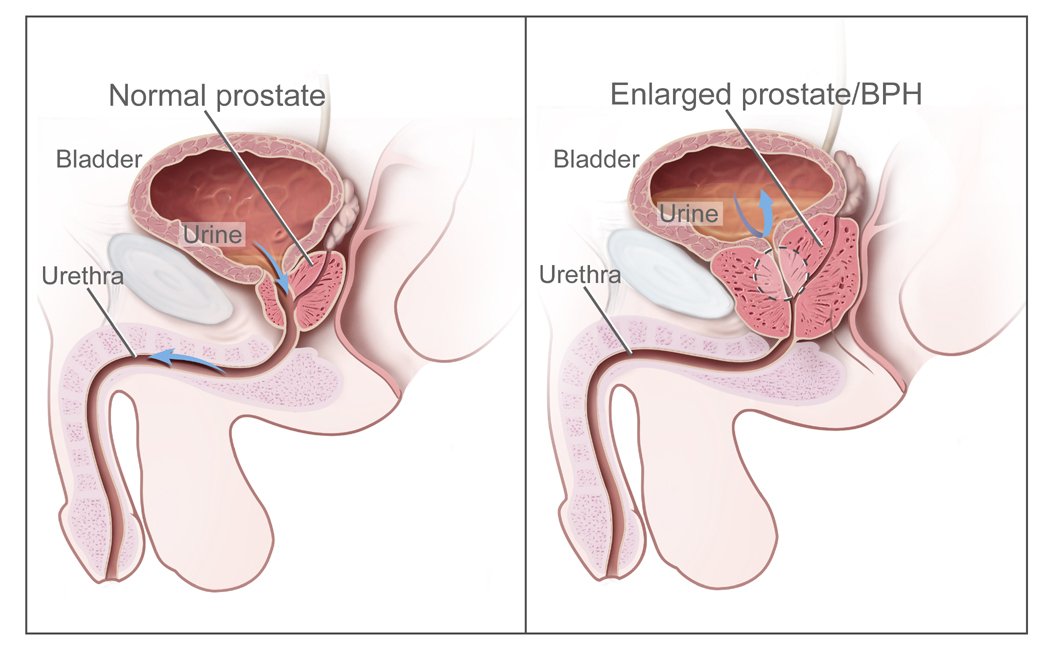Benign prostate enlargement or BPH is one of the most common prostatic ailments affecting men.
“By age 60, half of all men will have an enlarged prostate, a condition also known as benign prostatic hyperplasia, or BPH. By age 85, the proportion reaches 90%“ according to Harvard Medical School.
The symptoms of BPH include difficulty in passing urine, inability to start the flow of urine, dribbling of urine, and a sensation of incomplete emptying of the bladder.
It has been estimated that more than half of men develop BPH by the age of 60. The risk of this condition rises significantly as age increases.
Though BPH is not known to increase the risk of prostate cancer or sexual difficulties, it can make matters worse. It affects the quality of life of men by causing embarrassing and annoying symptoms linked to urination.
–> Find out the best ways to look after your prostate health: https://alpharisehealth.com/why-prostate-health-is-vital
According to Dr. Howard LeWine, the chief medical editor at the Harvard Health Publishing, most men consider frequent trips to the bathroom as a natural part of aging particularly because the symptoms of prostate enlargement develop gradually.
However, it is important to note that it is possible to relieve these symptoms and control the progress of BPH by using medications, following a healthy diet and complementing the treatment with prostate health supplements. This can improve the quality of life of men by allowing them to sleep peacefully without the need to visit the bathroom frequently.
Read further to find more information about BPH and the ways to manage it in a safe and effective way.
The development of BPH
The prostate gland has a tendency to grow in size after a certain age. It usually grows from the size of a small walnut to the size of a lemon. This increase in size could be attributed to the changing levels of certain hormones including dihydrotestosterone, which tends to produce a stronger action on the prostate gland after the age of 40 or 50 years.
Since the prostate is situated just below the urinary bladder, its enlargement can create pressure on the bladder as well as urethra, the tube carrying urine from the urinary bladder through your penis during urination. The pressure, thus created, is responsible for the urinary symptoms experienced by men suffering from BPH.
You may experience difficulties in beginning the flow of urine, and dribbling afterward. It may also cause symptoms such as not having emptied the bladder fully. The obstruction or pressure on the urinary organs can also result in the accumulation of urine in the bladder. This can also increase the risk of infections, which, in turn, can cause pain while passing urine, and worsen the increased frequency of urination.
–> Find out the best ways to look after your prostate health: https://alpharisehealth.com/why-prostate-health-is-vital
The role of BPH drugs in cancer prevention
Earlier research studies had suggested that the treatment of BPH using 5-alpha-reductase inhibitors (5-ARI) may increase the chances of developing prostate cancer in the future.
However, the latest studies have revealed that 5-alpha-reductase inhibitors do not appear to increase the risk of prostate cancer. On the contrary, regular treatment with these drugs may protect the gland against cancerous changes.
For example, a research study from the Prostate Cancer Prevention Trial has indicated that the use of 5-ARI group of drugs like finasteride (Proscar) for 7 years may lower the risk of developing low-grade prostate cancer by nearly 25% in men above the age of 55 years.
A follow-up study that was published in the Journal of the National Cancer Institute in its Nov. 1, 2018 issue has revealed that finasteride could lower the risk of cancer by 21%. This protective effect was found to have lasted for nearly 16 years.
Management of BPH
Men are advised to consult a doctor if they experience the symptoms of this disease. The doctor may perform a digital rectal examination to assess the size or growth of the prostate gland.
Patients are advised to perform urine tests to evaluate the presence of infections in the bladder.
Appropriate antibiotics may be prescribed in case of infections.
—> Are you looking for a natural supplement to help your prostate? Click this link for access to special discounts on our premium, money back guaranteed, natural formula – Ultimate Prostate Support.
Diet & Supplements
Food
By doing small changes in their diets, patients can alleviate the symptoms of an enlarged prostate. Certain foods are known to support prostate health and inhibit the progress of diseases such as prostate enlargement and cancer. Read about the do’s and don’ts of prostate health diet in the articles below:
-Article Link: Good Foods to Eat for Enlarged Prostate Health
-Article Link: Which Foods to Avoid for Enlarged Prostate Health?
Herbs
A number of natural herbs have been show to have a significant improvement in a high number of cases. Saw Palmetto is slow to work but is the most effective. Pumpkin Seeds, Pygeum and Zinc are also commonly used to help alleviate the symptoms by reducing the swollen glad.
-Article Link: Herbs for Prostate Health
Drugs
Men diagnosed with BHP can be treated with 2 classes of drugs: 5-alpha-reductase inhibitors (5-ARIs) and alpha blockers.
Alpha blockers
These medications work by causing relaxation of the muscles surrounding the prostate gland and the bladder. This can reduce the pressure on the urinary tract and ease the flow of urine. Most men can experience significant relief from symptoms within 2 days of using these drugs.
Commonly prescribed Alpha blockers for the management of BPH include doxazosin (Cardura), alfuzosin (Uroxatral), tamsulosin (Flomax), terazosin (Hytrin), and silodosin (Rapaflo). These medicines are more effective for men having mild to moderate BPH.
5-ARIs
The medications in this class work by inhibiting enzymes that cause prostate enlargement and thus, shrink the prostate gland. This reduces the pressure exerted by the enlarged prostate on the urethra and relieves urinary symptoms.
Treatment with 5-alpha-reductase inhibitors usually reduces the size of the prostate by one-quarter within 6 months to 1 year. The common drugs in this category are dutasteride (Avodart) and finasteride (Proscar).
Men who suffer from the symptoms of BPH with erectile dysfunctions can also use a lower dose of tadalafil (Cialis) once daily to restore their sexual functions.
Surgery for BPH
Some men may be advised to undergo surgery for the removal of excess tissues from the gland. Surgery is usually recommended when medications have failed to relieve the symptoms or caused serious side effects. Surgery is also advisable in case the patient has developed complications such as urinary retention and recurrent urinary tract infections.
Making appropriate changes in your diet by inducing foods that improve prostate health and avoiding foods that can worsen BPH symptoms is also recommended. Men diagnosed with BPH can use health supplements formulated to improve prostate health and relieve BPH symptoms. You can also visit our supplement store to find appropriate treatment solutions for managing your condition in a safe and effective way.
Source: Harvard Health Publishing
—> Are you looking for a natural supplement to help your prostate? Click this link for access to special discounts on our premium, money back guaranteed, natural formula – Ultimate Prostate Support.

